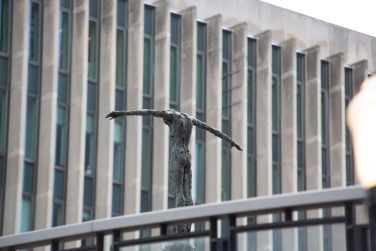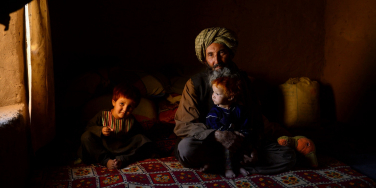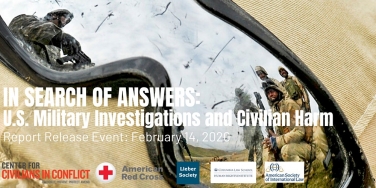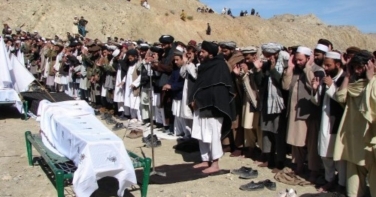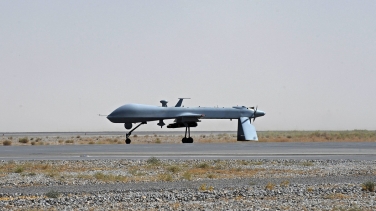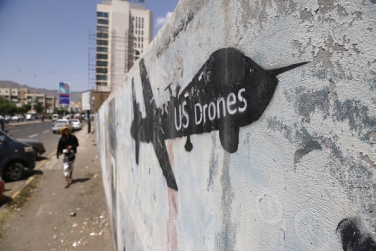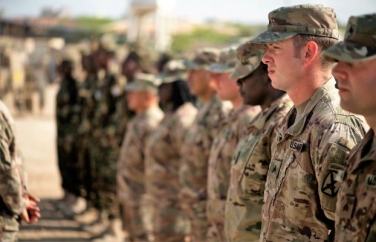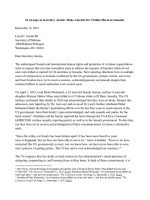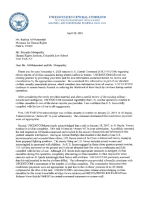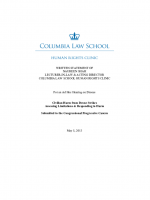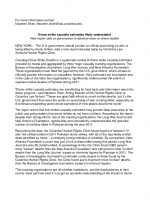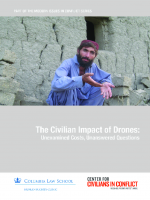HRI seeks to advance human rights in the context of armed conflict and counterterrorism, particularly the abuses and harms committed by the United States and its allies. Currently we are focused on pervasive human rights abuses committed in Yemen. These violations include the United States providing weapons and intelligence to Saudi Arabia and other states that commit violations in Yemen, unlawful use of force by the United States and other states through airstrikes and ground raids, unlawful blockades of entry ports, and the manmade famine and cholera epidemic in Yemen. Rightsholders who face abuses have no meaningful avenues to seek remedy, authorities do not conduct adequate investigations, and the warring parties continue to act with impunity.
Although some global efforts are under way to hold actors accountable, more concerted and coordinated action is needed. HRI works with Yemeni human rights organization Mwatana Organization for Human Rights (Mwatana) to better understand and strategically pursue various mechanisms at the international level. Our strategy includes increasing Yemeni NGO access to international forums as a means of boosting civil society power, and working to spotlight abuses by the Saudi-led coalition in Yemen.
HRI has conducted advocacy alongside our NGO partners at the UN Human Rights Council in Geneva, briefed delegations on human rights violations in Yemen, and submitted official written statements to treaty bodies. We have convened workshops bringing together experts on domestic and international litigation to explore the potential for victims and/or Mwatana to bring claims for human rights abuses in Yemen in international and U.S. domestic courts. We drafted a comprehensive handbook on the different international judicial and quasi-judicial mechanisms that exist for Mwatana to seek accountability for human rights abuses, including the advantages and disadvantages of each. And we have facilitated and participated in NGO strategic advocacy meetings that brought Yemeni civil society groups together with international organizations to discuss human rights and the war in Yemen.
The Human Rights Institute and Clinic have also studied how the U.S. military reports on its lethal operations and investigates reports of civilian harm. In 2017, the Clinic, in partnership with the Sana’a Center for Strategic Studies, published “Out of the Shadows: Recommendations to Advance Transparency in the Use of Lethal Force,” a report evaluating U.S. use of lethal force against a set of human rights–based benchmarks. The report’s authors developed these benchmarks based on the interests and rights of people impacted by U.S. strikes, international law, and the promotion of the rule of law and democratic accountability.
In 2020, we completed and released “In Search of Answers: U.S. Military Investigations and Civilian Harm,” an in-depth study of how the U.S. military carries out administrative investigations after receiving reports that its operations have harmed or killed civilians. The report, researched and written in partnership with the Center for Civilians in Conflict, examines why some claims do not lead to a full military investigation, and details flaws in the investigation process, including military investigators’ common failure to interview witnesses or survivors of attacks, or to visit sites where the military carried out attacks.
HRI has made significant contributions to the national and international debates on U.S. drone strikes. Government officials and policymakers have defended their policy of lethal drone strikes by characterizing drones as the most precise and humane weapons platform in the history of warfare. But U.S. “targeted killing” policies have failed to acknowledge the costs of covert drone strikes for civilians and local communities harmed in these operations. HRI’s work seeks to ensure greater awareness of the civilian impacts of U.S. wars using drones, and to foster informed public debate about the human and political costs of U.S. operations. We promote compliance with international law, transparency in the use of force, and accountability for legal violations.
Our report “The Civilian Impact of Drone Strikes: Unexamined Costs, Unanswered Questions” (2012), the first systematic study of the U.S. government’s covert drone program, critically assessed U.S. government procedures and standards for ensuring civilian protection and responding to civilian harm.
From 2014 to 2017, the Human Rights Clinic played a key role organizing and drafting joint NGO statements, letters, and memos to the Obama and Trump administrations on so-called “targeted killings” and drone strikes, focusing on the need for greater transparency, accountability, and respect for international law.
We also worked with Mwatana for Human Rights to advance transparency and accountability for the U.S. use of lethal force in Yemen. From 2019 to 2021, the Human Rights Clinic worked with Mwatana to submit cases of civilian harm resulting from U.S. operations in Yemen to the U.S. military, seeking acknowledgment and accountability for harm.
HRI carries out research and advocacy on the law on the use of force, leading to or highlighting the progressive statements of individual states and international institutions that reinforce protective human rights norms contrary to the U.S. expansive position.
In 2017, the Human Rights Clinic co‐led the drafting and coordinating of a joint NGO submission to the authoritative UN Human Rights Committee’s deliberations on its General Comment on Right to Life. Committee members cited our submission in discussions as they adopted language similar to the progressive position the Clinic advocated.
We have also convened policymakers and human rights advocates to strategize on how to advance protective legal norms. This critical work will likely lead to progressive positions published by the UN Committee, which will in turn influence international norms.


